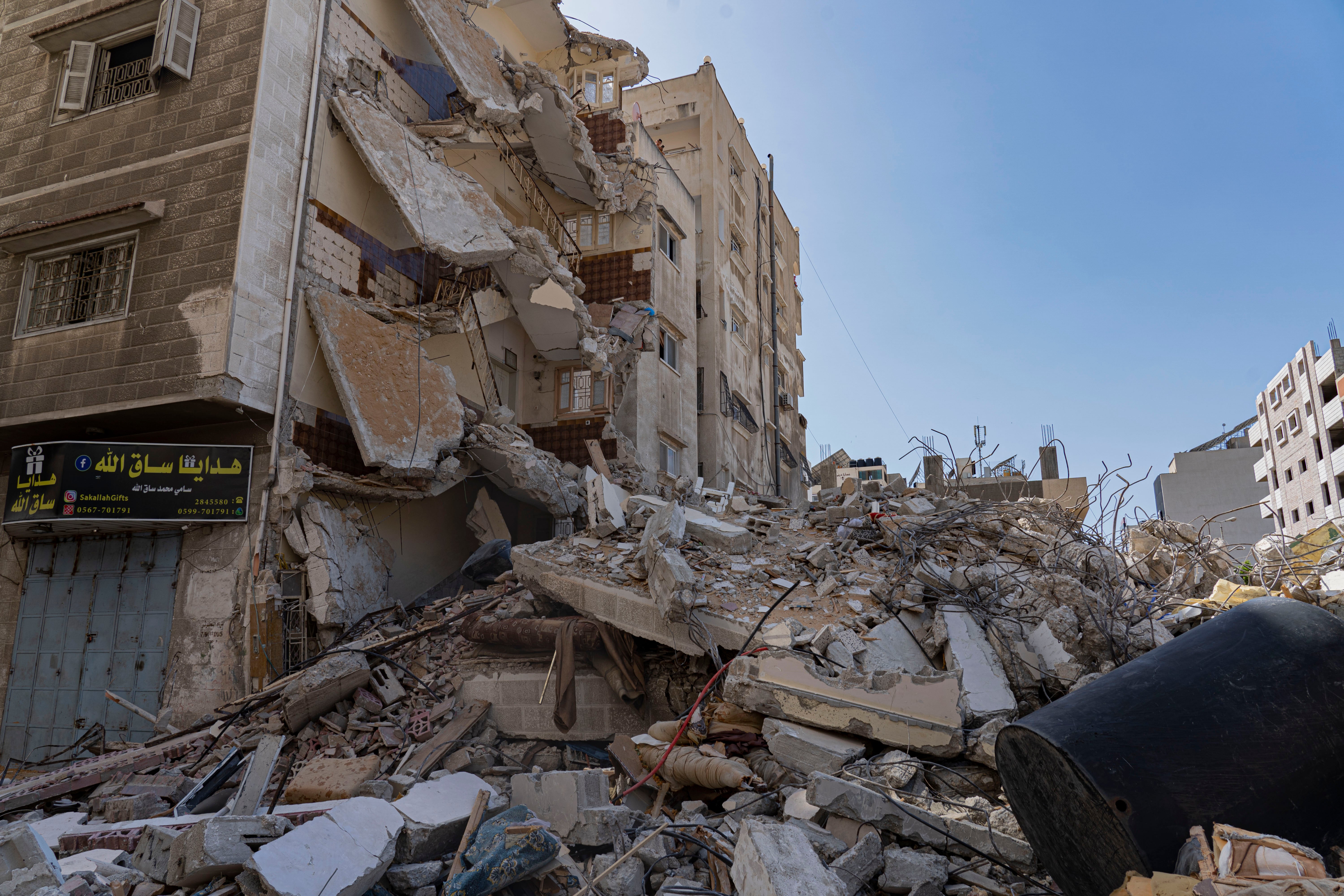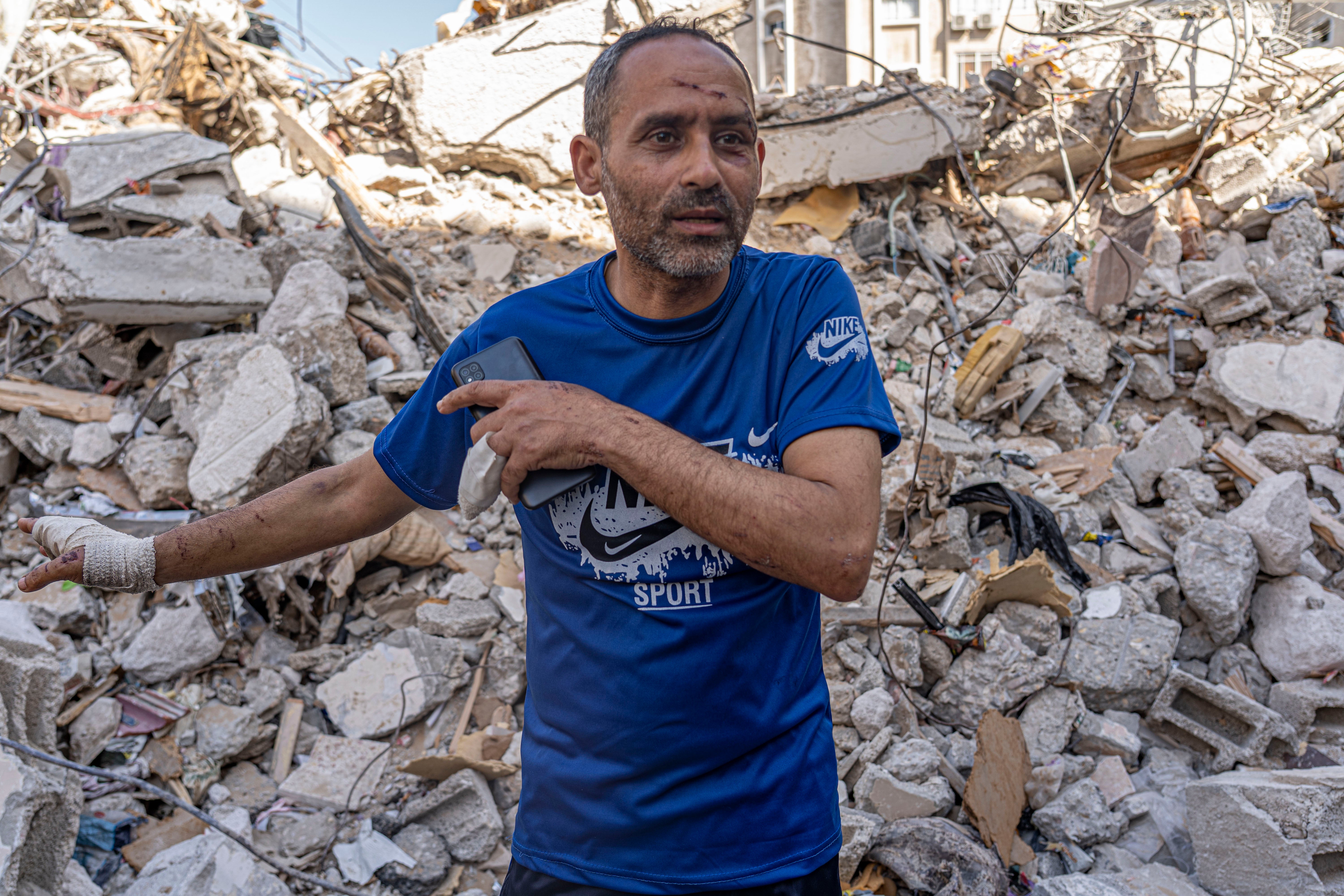Israeli airstrikes wiped out the family of Gaza’s leading doctor. Only his teenage son survived
One of the heaviest nights of Israel’s bombardment killed several families on Gaza City’s main Wehda street, reports Bel Trew


Your support helps us to tell the story
From reproductive rights to climate change to Big Tech, The Independent is on the ground when the story is developing. Whether it's investigating the financials of Elon Musk's pro-Trump PAC or producing our latest documentary, 'The A Word', which shines a light on the American women fighting for reproductive rights, we know how important it is to parse out the facts from the messaging.
At such a critical moment in US history, we need reporters on the ground. Your donation allows us to keep sending journalists to speak to both sides of the story.
The Independent is trusted by Americans across the entire political spectrum. And unlike many other quality news outlets, we choose not to lock Americans out of our reporting and analysis with paywalls. We believe quality journalism should be available to everyone, paid for by those who can afford it.
Your support makes all the difference.For twelve hours, Omar Abu al-Ouf, 17, clung to the body of his dead sister as they lay pinned under a patchwork of concrete floors, ceilings and walls that had collapsed on top of them.
In the mangled debris above him, his neighbour was also alive but suspended upside down between the snarls of steel and brick walls.
Just a few metres away his father, Dr Ayman Abu al-Ouf, one of the most senior doctors in Gaza, who was handling the coronavirus crisis, had been crushed to death.
The celebrated medic was killed alongside 12 other members of his extended family, as the several-storey building where they lived on Wehda Street, in Gaza City, was completely levelled in a rage of airstrikes.
“When the second missile hit, I tried to take my sister in my arms to protect her, but the third missile brought this wall of fire, and the floor disappeared beneath us,” Omar told The Independent from his hospital bed.
“A fourth missile hit the building and everything was wiped out.”
The secondary school student, whose arm is broken, his legs swollen with bruises, spoke from al-Shifa hospital, where he is being treated and where his father used to work as head of internal medicine.
His entire family, including his parents, two siblings and grandparents, was wiped out by the bombardment. Wounded and alone, Omar is struggling to comprehend being the sole survivor.
“I just want to know why they targeted my family? We are normal civilians, doctors,” he added, his face frozen in shock.
“What fault did we do to deserve this?”
Some of the most ferocious fighting ever recorded between militants in Gaza and the Israeli military erupted last Monday, the culmination of weeks of unrest in the simmering city of Jerusalem.
A shaky ceasefire was finally brokered by Egypt early on Friday morning.
After 11 days, more than 248 Palestinians had been killed, including 66 children and 39 women, according to Gaza’s health ministry.
Medics said that an unprecedented barrage of rockets had killed 12 in Israel. Among the dead were two children and a soldier.
But while the truce silenced the rocket launchers and halted the warplanes, in Gaza, families whose homes and lives were hit in the bombardment now have to come to terms with the extent of the devastation. Some 2,500 people have been made permanently homeless, while tens of thousands have been temporarily displaced. The authorities were still digging the dead, some of them militants, from the rubble.
And so on Friday, as families finally emerged from their homes to assess the damage to their lives, many angrily questioned the point of many of the targets.
The 16 May bombing of Wedha street, a heavily populated civilian neighbourhood and the main thoroughfare in Gaza’s biggest city, has sparked particular outrage within Gaza and abroad. It was among the most intense and controversial episodes of Israeli bombardments in this outbreak of fighting, killing over 40 people.
The air raids turned one of the busiest streets in Gaza, and the main access point to the strip’s chief hospital al-Shifa, into a crater-marked moonscape. In place of apartment blocks are mangled heaps of concrete fringed with curls of iron rebar and scraps of belongings.
In one 30ft hole, a smashed-up pipe yawns dirty water into the street. Azzas, or funeral prayers, where relatives gather to remember the dozens of dead from this one night of bombing, form a forlorn reef along the street.
According to Amnesty International, that night of airstrikes completely levelled two residential buildings belonging to the Abu al-Ouf and al-Kolaq families, killing 30 people – 11 of them children.
Further down the same road it also killed Dr Muin Ahmad al-Aloul, Gaza’s only neurologist, with his five children and wife.

Medecins Sans Frontieres said that one street away, the same night of bombings damaged one of its clinics which had been providing treatment for trauma and burns, leaving the sterilisation room completely “unusable”.
Witnesses and survivors told The Independent that none of the buildings or clinics were given prior warning ahead of the strikes.
When questioned about the purpose of the attack, the Israeli army said Hamas, the militant group that runs Gaza, bears responsibility for “intentionally locating its military infrastructure under civilian houses, thus exposing civilians to danger”.
It said a “preliminary” investigation into the attack found that Israeli aircraft struck “underground military infrastructure” that was located under the road.
“The underground military facilities collapsed causing the foundations of the civilian houses above them to collapse as well leading to unintended casualties,” a statement read.
“The aim of the [Israeli army] strike was the military infrastructure. The IDF aspires to avoid civilian casualties as far as possible.”
But for the families that were caught up in the bombing of the building which the Abu al-Oufs called home, it was devastating.
Riad Shkuntina, 42, whose family lived a floor above Dr Abu Al-Ouf, said the last thing he remembers is watching his wife try to pull their children out from underneath the rubble of the initial airstrike before a second missile levelled the entire building.
“She was screaming, and then the floor fell from beneath my feet,” he said.
“They found my daughter Susie upside down with her head between two bricks, which saved her. I was under the rubble for six hours, my daughter for ten.”

The other four children and his wife were killed.
Fifteen minutes after the strike, Mohamed, Omar’s maternal uncle, was among those desperately digging through rubble to find the trapped survivors.
“This family are among the most educated and dedicated families in Gaza,” he told The Independent while standing next to the yawning crater where the building used to stand.
“Dr Ayman and his father, who was also killed, were offered medical positions abroad but refused [in order] to look after Palestinians here.”
“It’s not just a loss for us as a family but for the whole of Gaza.”
Back in al-Shifa, Omar is being looked after by his uncles, who are now the only family he has left.
“I would like to know why they decided to kill my entire family? Why did they turn me into an orphan at just 17?
“What did we do to deserve this?”
Join our commenting forum
Join thought-provoking conversations, follow other Independent readers and see their replies
Comments